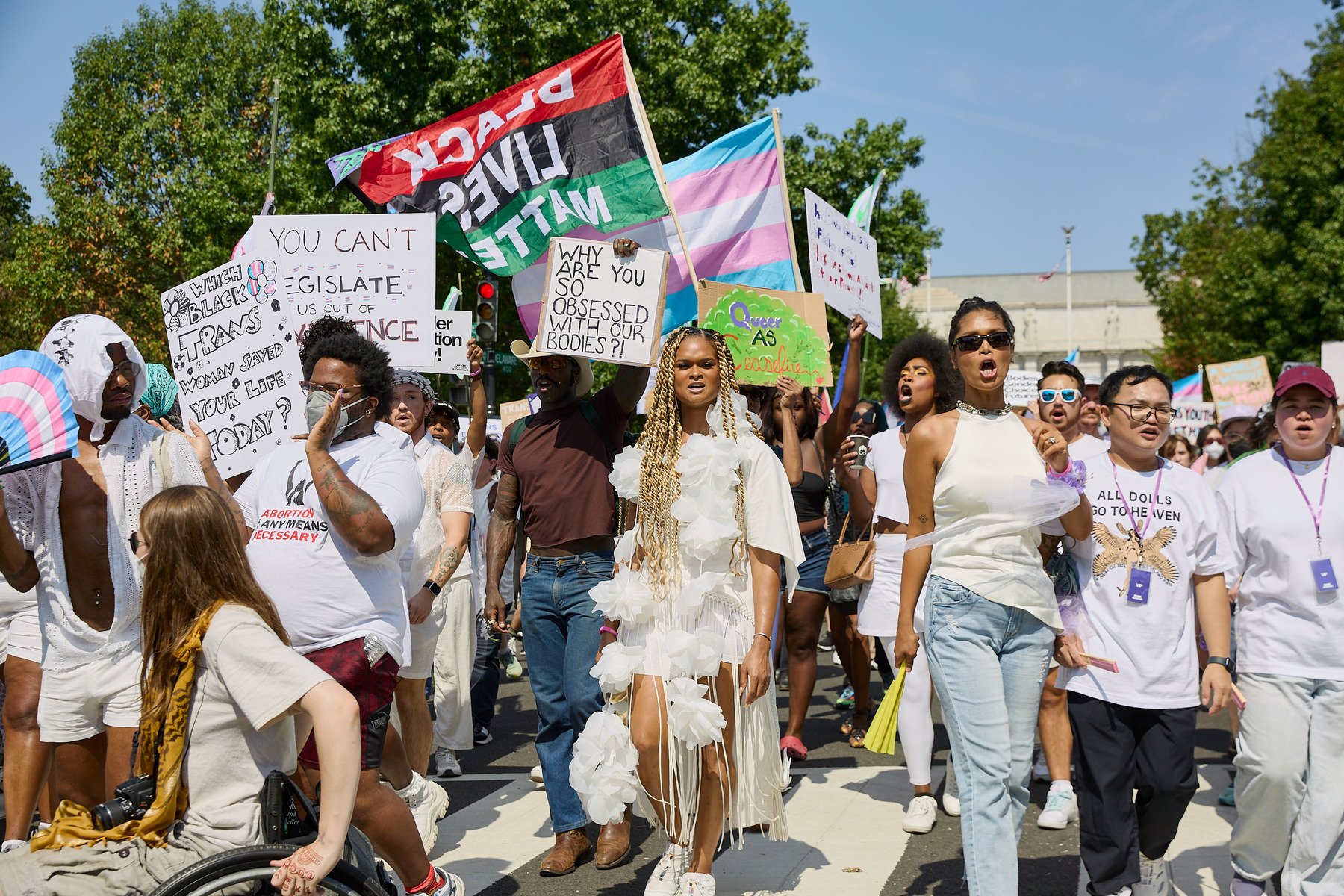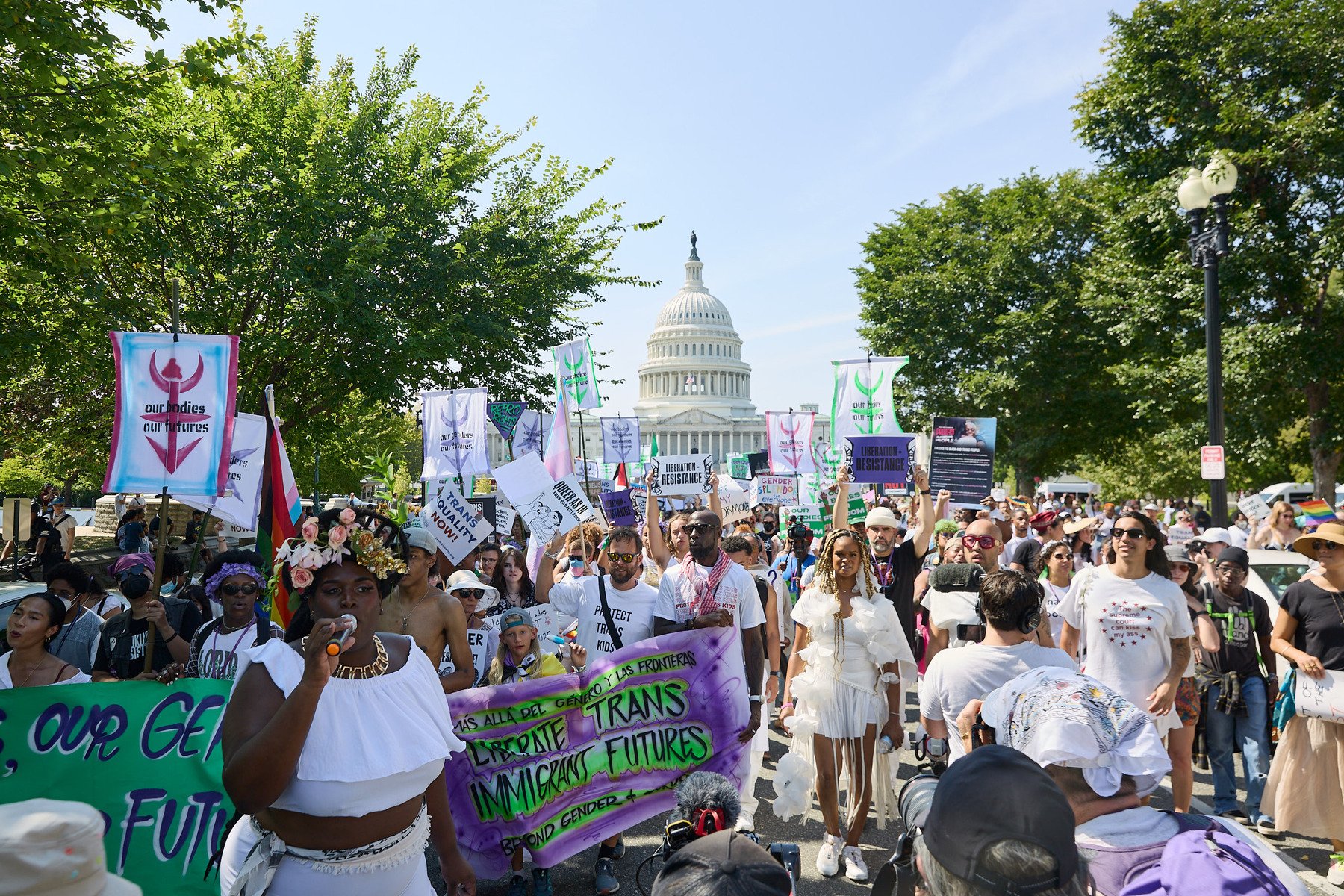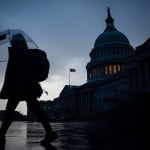Your trusted source for contextualizing Election 2024 news. Sign up for our daily newsletter.
Under Pride flags, Black Lives Matter flags and Palestinian flags, thousands of LGBTQ+ people and their loved ones danced and chanted through the inaugural Gender Liberation March in Washington, D.C., on Saturday to send one unifying message: that fights for reproductive rights and transgender rights are inextricably linked.
“The overarching goal here is to make these connections, to get folks to start understanding that all of our rights are on the chopping block,” said Raquel Willis, a transgender writer and activist who co-organized the march. She wants to remind Democrats that abortion is also a trans issue, she said in an interview with The 19th.
Protesters marched in defiance of state legislation restricting their access to gender-affirming care, of the Supreme Court decision that overturned the constitutional right to an abortion, and of the extreme anti-LGBTQ+ agenda detailed in Project 2025. They traveled to Washington on buses from Atlanta; Baltimore; New York City; Chattanooga, Tennessee; and Durham, North Carolina. The protesters wanted to show the powers that be that their power is limited — and that trans joy and queer joy do not need permission to exist.
On the streets surrounding the U.S. Capitol, roughly 2,000 protesters echoed chants led by Qween Jean, activist and founder of Black Trans Liberation: “We are America too,” followed by “Wake up, wake up, this is your fight too,” “Abortion is a human right,” and “Our bodies, our business.”
Leslie Jennifer Porter, who also goes by Stormy, and Frances George took a bus from New York City that was sponsored by the event organizers. They both listened as high-profile activists and celebrities shared their experiences trying to access abortions, reproductive health care and gender-affirming care. They both marched through Washington to protest the political forces seeking to ban such care. And they each brought their own signs with their own message.
George, 25, came to Washington to convey her opposition to the anti-trans legislation that has flooded statehouses in recent years. On a colorful sign, she had drawn bills banning gender-affirming care for minors and Florida’s “Don’t Say Gay” bill burning in a fire speckled with gold glitter.
“I’m feeling like my voice has a strong power,” she said. “There’s more power together. Our voices sound louder, instead of being drowned out by a lot of other people.”
Porter’s sign, which she had worked on with friends, carried a simple message of love adorned with a few hearts: “I Love Trans Folks, They Are Lovely.” Porter, 37, carried that sign past dozens of bicycle police guarding the grounds to the Capitol, as she and other protestors marched to the Supreme Court and back to Columbus Circle.
George had felt nervous surrounded by so many police officers along the route. She felt like they could and would find any excuse to arrest her. Other than keeping protesters on the street and off of the sidewalk, the police kept their distance during the march. There were few counter-protesters on the march route. As the march reached the Supreme Court, five men stood and watched across the street. They held an “Appeal to Heaven” banner symbolic of the far-right and Christian nationalist movement, wore MAGA apparel and held an anti-abortion sign.
But those in the Gender Liberation March didn’t appear to engage with the counter-protesters, either because they didn’t notice them or chose to ignore them. Like Porter, they carried their own declarations of love: a glittery sign reading “gender splendor is for everyone,” a father’s sign that read “walking for my son Nate, he is the best,” another that read “a world without trans people has never existed.”
For the march organizers, threading resistance with joy and love was crucial — because to them, that joy is the antidote to the policies harming LGBTQ+ people, they said. That’s why a professional DJ was ready to hype up the crowd for a vogue-filled dance party outside the Heritage Foundation headquarters. The conservative foundation is the architect of Project 2025, a policy blueprint for a second Trump administration that would dramatically roll back LGBTQ+ rights.
“Some of the parents were crying,” said Eliel Cruz, a veteran activist and march co-organizer, describing the scene as protesters reached the Heritage Foundation building, and some started dancing. “When you’re in states where you’re having to nonstop fight these attacks and maybe flee, you just never get a chance for joy.”
One of the families on Cruz’s mind is 17-year-old Daniel Trujillo and his parents from Tucson, Arizona. For years, Daniel and his mom, Lizette Trujillo, have driven back and forth to the state’s capital to testify against anti-LGBTQ+ bills and speak out against efforts to ban the gender-affirming care that Daniel relies on.
On Saturday, Trujillo wasn’t just at the Gender Liberation March to support her transgender son — she was there as someone who chose to have an abortion at 22 and who suffered a miscarriage at 40. At Columbus Circle, with the Capitol building in the distance behind her, Trujillo said that when she saw everyone dance outside the Heritage Foundation, she felt herself start to sob.
“The last six years have been exhausting,” she said. “We’ve been targeted by Breitbart, doxxed, spent many nights worried about Daniel’s safety. But all this worry has only fueled our advocacy,” she said.
Another parent of a transgender child, Stephen Chukumba, took the stage in D.C. by reading the names of young trans people who were killed or had died by the age of 25. The list was long, and included instances of lethal or near-lethal violence perpetrated on trans youth by other children. Chukumba’s own son is 18.
“This hateful rhetoric is seeping into the psyches of our children, turning them into weapons … it’s not just a war on trans people, it’s a war on all people,” he said. “Children are being groomed by a society that teaches them to fear difference. Hate is a learned behavior.”
Multiple speakers at the Gender Liberation March urged for action and warned against apathy in the face of rising violence against trans people.
“Some of us won’t make it to the land we are trying to create. But the babies are watching us,” said activist Aaryn Lang on Saturday, outside the Supreme Court. “We do not have the luxury of treating very real threats like a difference of opinion … They really want us dead, y’all. They want us gone, today. So please, again, to the people with resources and power, quit acting like you can’t do anything.”
Cruz said that advocates had seen a “glaring” lack of inclusion of trans issues in campaign conversations leading up to the presidential election.
“Mobilizations like these are definitely meant to push and remind and urge our electeds that we’re making these connections and are paying attention, and we need them to as well,” Cruz said.

Organizers scheduled the march before President Joe Biden gave up his bid for a second term in the White House and endorsed Vice President Kamala Harris to be the Democratic nominee. At the time, Democrats were predicting that former President Donald Trump would win the election and implement extremist anti-LGBTQ+ policies. Since Harris became the Democratic nominee, the tenor of the election has shifted. But Cruz and others say LGBTQ+ Americans face an existential crisis no matter who takes the White House next year.
Organizers want Democratic leaders to speak explicitly about the vitriol against trans kids and adults.
“It’s clear that speaking directly about the attacks, particularly on trans, non-binary folks, feels like a liability to a lot of our democratic leaders,” Willis told The 19th in an interview ahead of the march. “There’s really nothing but insinuation around ‘being your full self in this country and having the freedom of that’ but really little to no direct nods to the attacks on trans people happening across the country,” she added.
Advocates have fumed about the lack of meaningful engagement on LGBTQ+ issues from the media. At the September 10 debate between Harris and Trump, moderators didn’t ask any questions about LGBTQ+ issues.
“The debate included only one mention of LGBTQ Americans, a smear against transgender people that went unchallenged,” said a statement from Sarah Kate Ellis, president of GLAAD, the nation’s largest LGBTQ+ media advocacy group. “Campaign reporters and debate moderators are urged to ask questions that reveal a candidates’ records, views and plans for LGBTQ Americans, so that our community is included as they are in everyday life, not simply as political talking points.”
LGBTQ+ people and their allies increasingly represent one of the most powerful, if not forgotten, voting blocs in the nation, advocates argue. LGBTQ+ people make up eight percent of the population, according to census data.
Two years ago, The Human Rights Campaign (HRC), a national LGBTQ+ rights organization, published a report which found that queer voters would likely make up a fifth of the electorate by 2040. Even in 2024, their influence is expected to be outsized.
GLAAD reported in February that 94 percent of LGBTQ+ people surveyed said they were likely to vote in this year’s presidential election.
And LGBTQ+ voters aren’t the only ones voting on LGBTQ+ issues, advocates point out. HRC has increasingly identified “Equality Voters,” people who are not LGBTQ+ but vote with LGBTQ+ issues in mind. The organization reported that 75 million Americans are motivated to vote on LGBTQ+ rights.
A few steps from the large-scale replica of the Liberty Bell that marks the center of Columbus Circle, actor Elliot Page and Stonewall veteran Miss Major Griffin-Gracy took the stage at the march. The Trans Latina Coalition, the Black LGBTQIA+ Migrant Project, and WeTestify, an organization that shares personal stories about abortion access, brought speakers as well.
“Everyone’s bodily autonomy and self-determination is under attack,” Willis said in a statement after the march. “While this movement centers trans and nonbinary people, women of all experiences, and those who may need abortion or IVF access at some point in their lives, we are fighting for everyone’s right to make decisions about their own bodies.”
The Gender Liberation Movement, the volunteer-run group that organized the march, intends to come back to Washington when the Supreme Court begins arguments for L.W. v. Skrmetti, the case that will determine whether gender-affirming care bans for transgender youth are unconstitutional. Those arguments are expected to take place in December at the earliest.
When Willis took the stage on Saturday, she had a message for everyone to take home with them: “I want every generation to come, to know that no matter how you live, how you love, what you look like, how you work, how you twerk, how you twirl, no matter what your dreams or fears or desires are, we do bear fruit.”




